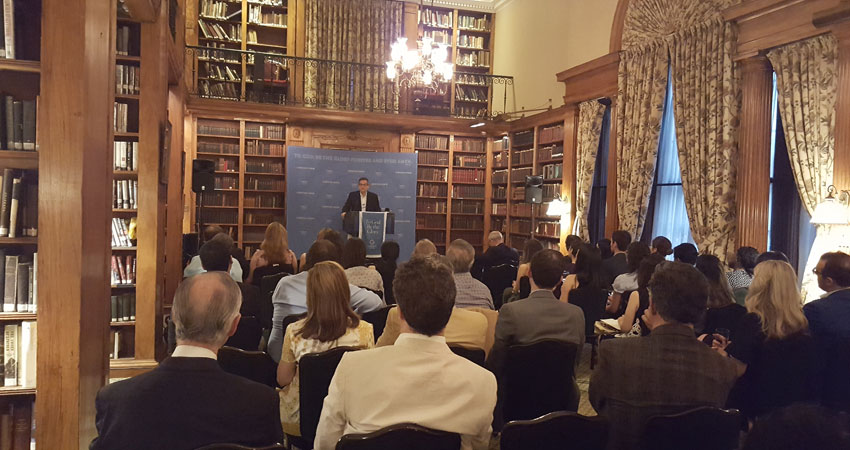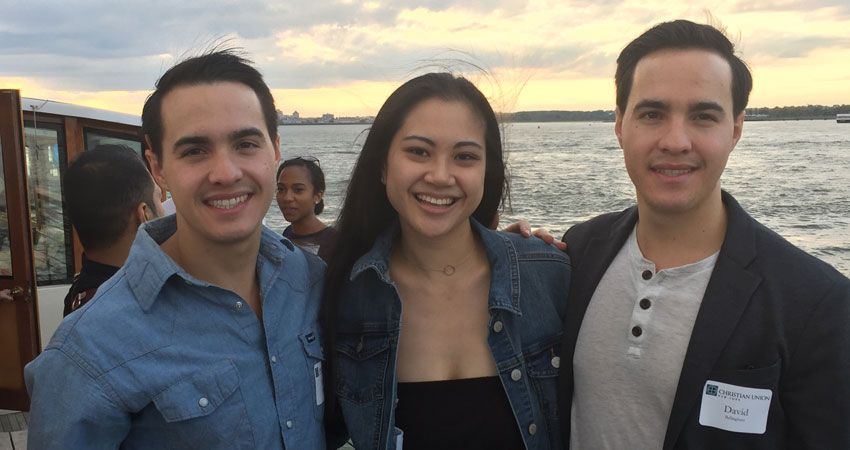Christian Union Cities
Christian Union New York
What a great time two weekends ago - most of two days...with amazing speakers on compelling ideas...engaged in prayer and worship...about being courageous in the ways of the Lord...in our city.One of our persistent longings, as Christians in the contemporary world, is for our own transformation to what we know we were made to be. We know, both intuitively and from scripture that we are made in the image of God and to be complete in Christ - not just theologically but experientially as well. And yet…the reality leaves us wanting so much more.
Miroslav Volf and Michael Croasmun, in their new book, For the Life of the Worldput it this way: “Flourishing requires the transformative presence of the true life in the midst of the false…”. What we long for is flourishing. We long to live fully in the life of the true rather than in the midst of the false.
Check out the plenary talks and breakout sessions from the Cities Conference to explore this more from different vantage points - but especially the talks on Sanctified Ambition, and Engaging the City.
- Scott Crosby, Ministry Director at Christian Union New York
We recently concluded our annual Christian Union Cities Conference. Held here in New York, June 21-22, the conference theme was taken from 2 Chronicles 17:6, Courageous in the Ways of the Lord. The church in America lives as “exiles in a strange land” as the apostle Peter describes in his first letter to the church in Asia Minor. Therefore, how we engage our city, community, vocation, and relationships becomes a matter of understanding both the culture and our faith, and our courage in stepping forward in engagement.
My wife and I recently hosted a dinner party around a discussion of the book, The Wind in the Willows. Like many enduring children’s books, this one from Kenneth Grahame operates on several levels - engaging for children with talking animals, humorous mishaps, and obvious good guys and bad guys; and stimulating for adults with its themes of deep community, perseverance, and morality. As we discussed these aspects, our conversation slowly wound toward our own community of faith - do we see these same issues extant in our relationships and church? It was a rich time of reflection on the praxis of our faith - are we swimming in the stream, or just dipping our toes in the water? It’s awfully easy to just do the latter.
Connect with Us

Connect with us through following us on our social media and signing up to be on our email list.
We will post clips from our speakers, pictures from our events, and announce upcoming events. Through our email list, we send event information, prayer requests, and share information for you to connect with our ministry in New York City. If you have any questions about CU New York, please reach out to us at cunewyork@christianunion.org. Instagram: @cucities
Facebook: https://www.facebook.com/cunewyork/
Twitter: @CUNewYork
CU New York email list: Click here to sign up

We hope to see YOU at our next event!
In a world fixated on the immediate and material we don’t often find ourselves part of conversations about transcendence. “Transcendent” is not a theological term, yet it certainly has theological relevance in its meaning of “supernatural”, “surpassing”, and “overarching”. In the just concluded Easter season the idea of transcendence is highlighted as we celebrate Christ’s death and resurrection. The resurrection in particular highlights God’s redemption of both our souls and, indeed, all things to the hope of glory and completeness in the new heavens and new earth.
At a recent event on the church in today’s cultural context, the speaker mentioned culture having “surface” structures and “deep” structures. Passing trends and changes in laws happen at the surface level while shifts in values and ways of understanding identity take place in the deep structures of culture. These latter changes happen over decades and are of a type that truly changeculture.
In a study of Judges that I’m involved in, there are a few lessons that jump out each week - lessons that have stood the test of time from before there were kings in Israel to 21st century New York. These insights make me regularly question my operating assumptions about faith and the world around me.
2019 brings a new year and a list of new resolutions. For CU New York it isn’t so much resolutions as our plans and initiatives for the year. We will, of course, continue our salons and forums that explore various aspects and implications of our faith in our vocations and the broader city. Additionally, there are other activities coming that will serve to build the kind of redemptive engagement we seek.
Merry Christmas! Since childhood, this has been a season I’ve looked forward to – the gatherings, anticipation, cookies, and yes, hopefully presents under the tree. Advent is actually that period of anticipation for the main event, the celebration of the birth of Christ. In recent years, I’ve begun to wonder why a sense and discipline of anticipation is important – for celebrations like Christmas, Easter, marriage, the birth of a child. For children it makes sense - children are, by their very nature, impatient and full of hopes – which is expressed in anticipation.
Earlier this week I was watching an interview with a Federal Reserve official on managing the US economy. In the course of the interview he made two interesting statements:
“We have to be data-dependent”, and
”I don’t see any clear signal from the market…”
Apart from the second statement seeming to mock the first, both statements reinforce the idea that a world consisting of humans filled with longings, hopes, fears, giddiness (at times), and relational dysfunctions is naturally best understood and motivated by data – that somehow data is unbiased and wise. In light of history I think it’s a weak argument, but one that nonetheless shapes the vocational worlds we all live in.





